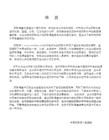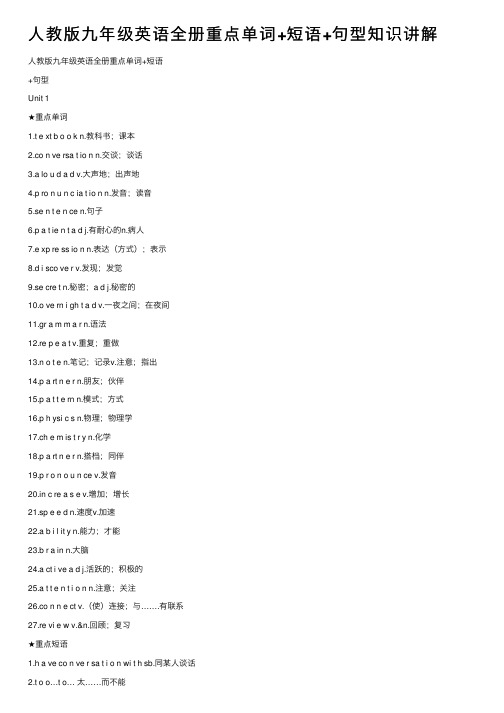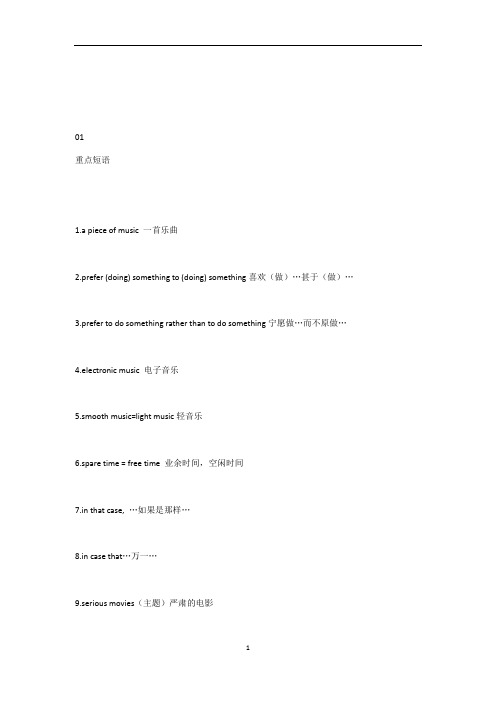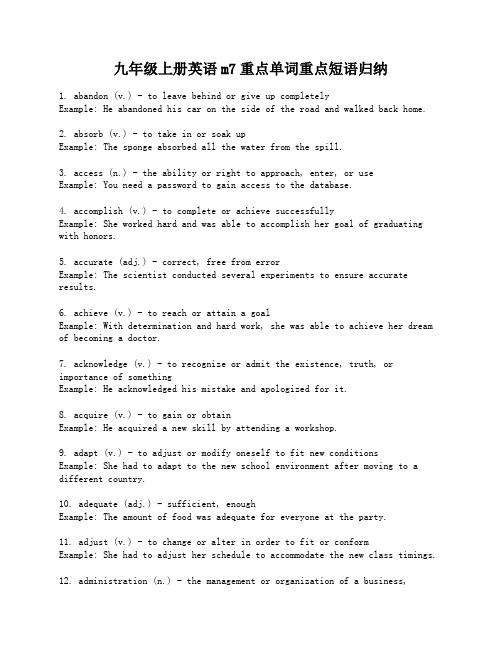九年级英语单元重点与短语(精)
九年级英语1-4单元复习要点

29.spend time doing 花时间做… 30.take sb. to concerts 带某人去音乐会
31.daily life 日常生活 32.afford to do 负担得起
Unit 1 复习要点
一、短语。
1. by making flashcards 通过做单词抽认卡 2. ask…for help 向某人求助
3. read aloud 朗读 4. that way (=in that way) 通过那种方式
5. improve my speaking skills 提高我的会话技巧
45. in the last few years 在过去的几年里 46.send messages 发信息
47.be able to 能够 48.be made up of … 由……组成的
49.sound like … 听起来像 50.instead of … 代替……
二、句型。
1.I used to be afraid of the dark. 我以前害怕黑暗.
2.I go to sleep with my bedroom light on. 我开着卧室的灯睡觉.
3.I used to spend a lot of time playing games with my friends.
11.do a survey about… 做有关…的调查 12.keep an English notebook 记英语笔记
13.spoken English (= oral English) 英语口语 14.make mistakes in sth 在… 犯错误
九年级英语第一单元重点词汇及短语归纳

U n i t1重点词汇一名词:n1.Textbook2.conversation3.pronunciation4.attention5.expression6.sentence7.patient8.secret9.grammar10.note11.physics12.chemistry13.speed14.partner15.ability16.brain17.knowledge二动词:v.1.discover2.repeat3.memorize4.pronounce6.increase7.born8.create9.connect10.review三形容词和副词adj& adv1.patient2.secret3.born4.Active5.lifelong6.aloud7.wisely重点短语:1.do A by doing B 用……的方式做2.be patient with sb/sth3.look up4.look up the new words in a dictionary5.be born with sth6.be born with the ability to learn/speak7.have sth in common 在某方面有共同特征8.depend on sth9.Pay attention to10.pay attention to sth /your pronunciation11.pay attention to doing sth12.be afraid to do sth /be afraid of doing sth13.connect A with B14.connect what you need to learn with sth interesting .四.句型:(一).A:How do you study English ?B:I study English by reading the textbook.(二)列举本单元英语学习方式方法:1.work with friends /a group2.ask the teacher for help3.make word cards4.listen to tapes and repeataloud5.watch English videos/movies /programms6.keep a diary in English7.have conversation with sb8.read aloud to practice pronunciation9.look up new words in a dictionary10.read word gruops 要按意群读11.listen to the conversation in English movies12.take notes/do exercises/read a lot13.write E-mail to sb(三)列举.英语学习过程中的困难。
人教版九年级英语全册重点单词+短语+句型知识讲解

⼈教版九年级英语全册重点单词+短语+句型知识讲解⼈教版九年级英语全册重点单词+短语+句型Unit 1★重点单词1.t e xt b o o k n.教科书;课本2.co n ve rsa t io n n.交谈;谈话3.a lo u d a d v.⼤声地;出声地4.p ro n u n c ia t io n n.发⾳;读⾳5.se n t e n ce n.句⼦6.p a t ie n t a d j.有耐⼼的n.病⼈7.e xp re ss io n n.表达(⽅式);表⽰8.d i sco ve r v.发现;发觉9.se cre t n.秘密;a d j.秘密的10.o ve rn i gh t a d v.⼀夜之间;在夜间11.gr a m m a r n.语法12.re p e a t v.重复;重做13.n o t e n.笔记;记录v.注意;指出14.p a rt n e r n.朋友;伙伴15.p a t t e rn n.模式;⽅式16.p h ysi c s n.物理;物理学17.ch e m is t r y n.化学18.p a rt n e r n.搭档;同伴19.p r o n o u n ce v.发⾳20.in c re a s e v.增加;增长21.sp e e d n.速度v.加速22.a b i l it y n.能⼒;才能23.b r a in n.⼤脑24.a ct i ve a d j.活跃的;积极的25.a t t e n t i o n n.注意;关注26.co n n e ct v.(使)连接;与…….有联系27.re vi e w v.&n.回顾;复习★重点短语1.h a ve co n ve r sa t i o n wi t h sb.同某⼈谈话2.t o o…t o… 太……⽽不能3.t h e se cr e t t o… ……的秘诀4.b e a f r a id o f d o in g st h./b e a f ra id t od o st h.害怕做某事5.l o o k u p查阅6.r e p e a t o u t lo u d⼤声跟读7.m a ke m i st a k e s i n在……⽅⾯犯错误8.co n n e ct……wi t h… 把……和……连接/联系起来9.ge t b o re d感到厌烦10.b e st re sse d o u t焦虑不安的11.p a y a t t e n t io n t o注意;关注12.d e p e n d o n取决于;依靠13.t h e a b il it y t o d o st h..做某事的能⼒★重点句型1.提建议的句⼦:①W h a t/h o w a b o u t+d o in g st h?做……怎么样?如:W h a t/H o w a b o u t go in g sh o p p in g?②W h y d o n't yo u+d o st h?你为什么不做……?如:W h y d o n't yo u g o sh o p p in g?③W h y n o t+d o st h?为什么不做……?如:W h y n o t go sh o p p in g?④L e t's+d o st h.让我们做……吧。
人教版九年级英语重点知识梳理词汇_短语句型语法

九年级英语知识点Unit 1I、重点短语:1.lisen to tapes 听录音2. ask the teacher for help 向老师请求帮助3. read aloud 朗读4. speaking skills 口头表达能力5.spoken English英语口语6. end up 结束ter on 以后,随后8. make mistakes 犯错,出错ugh at嘲笑,取笑10.take notes 做笔记,做记录11.look …up (在词典、参考书等中)查阅,查找12. make up 编造,组成13.deal / do with 处理,应付14.be angry with生……的气15.go by (指时间)过去,消逝16.try one’s best to do sth. 尽力做……17.break off 突然中止,中断18. with the help of 在……的帮助下19.regard…as…把……当做……20.be afraid of doing / to do sth 害怕做某事21. first of all 首先,开始22. have trouble / a difficult / hard time doing sth.做某事有困难II、重点句型:1.It’s too hard to understand the voices. 理解那些话有困难。
(It’s too ...to ....)2. How do you study for a test? I study by listening to tapes.我通过听磁带学习。
(by )3. Studying grammar is a great way to learn a language.(动名词做主语谓语用单数)4.I was afraid to speak in class. 我害怕在课堂上说话。
九年级上册英语重点短语归纳人教版

九年级上册英语重点短语归纳人教版Unit 1 How can we become good learners?1. ask sb. for help:向某人寻求帮助。
2. read aloud:大声朗读。
3. be afraid to do sth.:害怕做某事。
4. fall in love with:爱上。
5. look up:查阅(字典等)6. connect…with…:把……和……连接或联系起来。
7. pay attention to:注意;关注。
8. depend on:取决于;依靠。
9. in common:共同的;共有的。
Unit 2 I think that mooncakes are delicious!1. put on:增加(体重);发胖;穿上。
2. lay out:摆开;布置。
3. end up:最终成为;最后处于。
4. share sth. with sb.:与某人分享某物。
5. as a result:结果。
6. care about:关心;在意。
7. remind sb. of sth.:使某人想起某事。
Unit 3 Could you please tell me where the restrooms are?1. used to do sth.:过去常常做某事。
2. be used to doing sth.:习惯于做某事。
3. be used for (doing) sth.:被用于(做)某事。
4. on one's way to…:在某人去……的路上。
5. pass by:路过;经过。
6. pardon me:抱歉;对不起;请再说一遍。
7. from time to time:有时;偶尔。
Unit 4 I used to be afraid of the dark.1. deal with:应对;处理。
2. be proud of:为……骄傲;感到自豪。
人教九年级英语第九单元考点汇总(短语、句型、语法、作文)

01重点短语1.a piece of music 一首乐曲2.prefer (doing) something to (doing) something喜欢(做)…甚于(做)…3.prefer to do something rather than to do something宁愿做…而不原做…4.electronic music 电子音乐5.smooth music=light music轻音乐6.spare time = free time 业余时间,空闲时间7.in that case, …如果是那样…8.in case that…万一…9.serious movies(主题)严肃的电影10.war movies战争电影11.a happy/ sad ending 喜剧/悲剧结局12.try one’s best to do something尽某人最大努力做…13.solve their problems 解决他们的问题14.plenty of…= a lot of…= lots of…许多,大量的…15.shut off…关闭…,切断…16.once in a while一会儿17.a concert of Chinese folk music 一场中国民乐音乐会18.a simple name一个简单的名字19.look up the history of Erquan YingYue 查阅二泉印月的故事20.the sadness in the music 音乐中的伤感21.be born in the city of Wuxi 出生在无锡城22.musical instruments乐器23.musical ability音乐才能24.develop a serious illness生了重病25.make money挣钱26.get married to somebody 和…结婚27.continue to do something 继续做…28.be best known for…因为...而闻名29.grow worse 变得更糟糕30.in this way 用这种方法31.during his lifetime 在他的有生之年32.by the end of his life 在他生命终结之前33.one of the most moving pieces of music 最让人感动的音乐之一34.one of China’s national treasures 中国的民族瑰宝之一35.for this reason由于这个原因36.touch the hearts of people触动人们的心37.a time for spreading joy传播快乐的机会38.do an excellent job做得很完美39.have much experience 有很多经验40.painful experiences 痛苦的经历02重点句型1. While some people stick to only one kind of movie, I like to watch different kinds depending on how I feel that day.很多人执着于一种电影,然而我却喜欢看不同的电影,那取决于我那天的心情。
九年级英语各单元重点单词和短语

九年级上册英语m7重点单词重点短语归纳1. abandon (v.) - to leave behind or give up completelyExample: He abandoned his car on the side of the road and walked back home.2. absorb (v.) - to take in or soak upExample: The sponge absorbed all the water from the spill.3. access (n.) - the ability or right to approach, enter, or useExample: You need a password to gain access to the database.4. accomplish (v.) - to complete or achieve successfullyExample: She worked hard and was able to accomplish her goal of graduating with honors.5. accurate (adj.) - correct, free from errorExample: The scientist conducted several experiments to ensure accurate results.6. achieve (v.) - to reach or attain a goalExample: With determination and hard work, she was able to achieve her dream of becoming a doctor.7. acknowledge (v.) - to recognize or admit the existence, truth, or importance of somethingExample: He acknowledged his mistake and apologized for it.8. acquire (v.) - to gain or obtainExample: He acquired a new skill by attending a workshop.9. adapt (v.) - to adjust or modify oneself to fit new conditionsExample: She had to adapt to the new school environment after moving to a different country.10. adequate (adj.) - sufficient, enoughExample: The amount of food was adequate for everyone at the party.11. adjust (v.) - to change or alter in order to fit or conformExample: She had to adjust her schedule to accommodate the new class timings.12. administration (n.) - the management or organization of a business,government, or institutionExample: The administration of the school implemented new policies to improve student performance.13. adopt (v.) - to take and raise as one's own childExample: They decided to adopt a baby from another country.14. advantage (n.) - a condition or circumstance that gives one a favorable position over othersExample: His height gave him an advantage in basketball.15. advice (n.) - a suggestion or recommendation about what to doExample: She sought her friend's advice before making a decision.16. affect (v.) - to influence or cause a change in somethingExample: The news of the accident affected her greatly.17. agriculture (n.) - the science, art, or practice of cultivating the soil, producing crops, and raising livestockExample: The country relies heavily on agriculture for its economy.18. aid (n.) - assistance, helpExample: The Red Cross provided aid to the victims of the natural disaster.19. aim (v.) - to direct one's efforts towards achieving a specific goal Example: They aimed to finish the project by the end of the week.20. alert (adj.) - aware, attentive, watchfulExample: The security guard remained alert throughout the night shift.21. alliance (n.) - a union or association formed for mutual benefit, especially between countries or organizationsExample: The two companies formed an alliance to collaborate on a new project.22. alternative (n.) - an option or choice between two or more possibilities Example: If you don't like this restaurant, there are plenty of alternatives nearby.23. ambitious (adj.) - having a strong desire to succeed or achieve something Example: She has always been ambitious and aims for the top positions in her career.24. analyze (v.) - to examine or study carefully in order to understand or explainExample: The scientist analyzed the data collected during the experiment.25. ancestor (n.) - a person from whom one is descended, such as a grandparent or great-grandparentExample: He researched his family tree and traced his ancestors back to Ireland.26. ancient (adj.) - very old, from a long time agoExample: The ruins of the ancient city were discovered during an archaeological dig.27. annoy (v.) - to irritate or bother someoneExample: The constant noise from the construction site annoyed the neighbors.28. annual (adj.) - happening once a yearExample: The school holds an annual sports day for students.29. anticipate (v.) - to expect or look forward to somethingExample: She anticipated a promotion after working hard for several years.30. anxious (adj.) - feeling worried or nervous about something that may happenExample: He was anxious about his upcoming job interview.31. apologize (v.) - to say sorry or express regret for something you have done wrongExample: She apologized for arriving late to the meeting.32. apparent (adj.) - clearly visible or understood; obviousExample: The cause of the fire was not apparent at first, but further investigation revealed it was due to faulty wiring.33. appreciate (v.) - to recognize the value or significance of something; to be grateful forExample: I really appreciate your help with this project.34. approach (v.) - to come near or closer to someone or somethingExample: She approached the teacher after class to ask for clarification.35. appropriate (adj.) - suitable or proper in the circumstancesExample: Wearing casual clothes to a formal event would not be appropriate.36. argue (v.) - to give reasons for or against something; to engage in a verbal disagreementExample: They argued about the best way to solve the problem.37. artificial (adj.) - made or produced by humans rather than occurring naturallyExample: The flowers in her garden were artificial, but they looked real.38. ashamed (adj.) - feeling guilty or embarrassed about something that one has doneExample: He felt ashamed of his mistake and apologized.39. assess (v.) - to evaluate or determine the nature, quality, or importance of somethingExample: The teacher assessed the students' understanding of the lesson through a quiz.40. associate (v.) - to connect or link something with something else in one's mindExample: She always associates the smell of coffee with mornings.41. assume (v.) - to suppose or take for granted without evidenceExample: He assumed she would be at the party, but she had to cancel.42. attach (v.) - to fasten or join one thing to anotherExample: Please attach your resume to the job application.43. attempt (v.) - to try or make an effort to do somethingExample: He attempted to climb the mountain but had to turn back due to bad weather.44. attractive (adj.) - pleasing or appealing to the senses or mindExample: The painting was very attractive and caught the attention of many visitors.45. authority (n.) - the power or right to give orders, make decisions, or enforce obedienceExample: The principal has the authority to make disciplinary decisions.46. avoid (v.) - to keep away from or prevent oneself from doing something Example: She tried to avoid eating junk food to maintain a healthy diet.47. aware (adj.) - having knowledge or consciousness of somethingExample: He was not aware of the new company policy.48. balance (n.) - a state of equilibrium; equal distribution of weight or importanceExample: It is important to maintain a work-life balance.49. ban (v.) - to prohibit or forbid the use, action, or presence of something Example: Smoking is banned in this restaurant.50. bare (adj.) - without any covering or decoration; emptyExample: The room was bare, with no furniture.51. barrier (n.) - a fence or other obstacle that prevents progress or access Example: They removed the barrier and allowed people to enter the park.52. benefit (n.) - an advantage, privilege, or gain that is acquired or derived from somethingExample: Regular exercise has many health benefits.53. blend (v.) - to mix or combine together to form a harmonious whole Example: She blended different spices to create a unique flavor.54. bless (v.) - to consecrate or request divine favor for someone or somethingExample: The priest blessed the couple before their wedding ceremony.55. blame (v.) - to hold responsible or accountable for somethingExample: She blamed her brother for breaking her favorite vase.56. bland (adj.) - lacking strong flavor or character; dullExample: The soup was too bland, so I added more seasoning.57. blend (n.) - a mixture of different elements or substancesExample: The smoothie was a blend of fruit and yogurt.58. bless (v.) - to confer or invoke divine favor upon something or someone Example: He asked God to bless his family.59. boast (v.) - to talk with excessive pride or self-satisfaction about one's own achievementsExample: He boasted about his high test scores.60. bond (n.) - a close connection or relationship between people or things Example: The bond between siblings is often very strong.61. boundary (n.) - a line or area that marks the limits of something Example: The fence marks the boundary between our property and the neighbor's.62. burden (n.) - a load, typically a heavy one, that is difficult to bear Example: The responsibility of taking care of her younger siblings was a burden for her.63. calculate (v.) - to determine or ascertain by mathematical methods; to estimate or predictExample: She calculated the total cost of the project.64. capable (adj.) - having the ability or capacity to do somethingExample: She is capable of handling multiple tasks at once.65. capture (v.) - to take into one's possession or control by force Example: The police were able to capture the criminal.66. care (n.) - the provision of what is necessary for the health, welfare, maintenance, and protection of someone or somethingExample: He took care of his sick mother.67. celebrate (v.) - to honor or acknowledge a significant event or occasion with festivities or rejoicingExample: They celebrated their wedding anniversary with a romantic dinner.68. challenge (n.) - a task or situation that tests someone's abilities or strengthExample: Climbing Mount Everest is a great challenge.69. champion (n.) - a person who has defeated all opponents in a competition or struggled for a causeExample: He became the champion of the tennis tournament.70. chaos (n.) - complete disorder and confusionExample: The classroom was in chaos after the students' food fight.71. characterize (v.) - to describe the distinctive features or qualities of someone or somethingExample: The protagonist in the novel is characterized as brave and intelligent.72. charity (n.) - an organization set up to provide help and raise money for those in needExample: She donated money to a charity that supports education for underprivileged children.73. cheer (v.) - to give a shout of encouragement or applauseExample: The crowd cheered when their team scored a goal.74. cherish (v.) - to hold dear or deeply love something or someone Example: She cherished the necklace her grandmother gave her.75. clarify (v.) - to make clear or understandable by explaining in more detailExample: The teacher clarified the instructions for the assignment.76. classify (v.) - to arrange or organize into categories or groups Example: The books in the library are classified by genre.77. claw (n.) - a sharp, curved nail on the foot of an animalExample: The cat used its claws to climb up the tree.78. client (n.) - a person or organization using the services of a professional or companyExample: She met with her client to discuss their business needs.79. cling (v.) - to hold on tightly to something or someoneExample: The child clung to his mother's hand.80. collapse (v.) - to fall down or give way suddenlyExample: The building collapsed after the earthquake.81. colleague (n.) - a person with whom one works, especially in a profession or businessExample: She had a meeting with her colleagues to discuss the new project.82. collide (v.) - to crash or come into contact with great forceExample: The two cars collided at the intersection.83. colony (n.) - a group of people who settle in a new territory, but remain under the political control of their native landExample: The early English settlers established colonies in America.84. combine (v.) - to join or merge together to form a single entity Example: She combined flour, sugar, and eggs to make a cake.85. comfort (n.) - a state of physical ease and freedom from pain orconstraintExample: The soft bed provided great comfort after a long day.86. communicate (v.) - to share or exchange information, news, or ideas Example: They communicated through email while they were away.87. compare (v.) - to examine the similarities and differences between two or more thingsExample: She compared the prices of different brands before making a purchase.88. compete (v.) - to strive or vie against others in order to achieve a goal or win a prizeExample: Athletes from around the world compete in the Olympics.89. complete (adj.) - having all the necessary or appropriate parts; whole Example: She handed in her complete assignment on time.90. complicated (adj.) - consisting of many interconnecting parts or elements; intricateExample: The instructions for assembling the furniture were very complicated.91. concentrate (v.) - to focus one's attention or mental effort on a particular task or objectExample: She closed the door to concentrate on her studying.92. concern (n.) - a matter of interest or importance to someone; a feeling ofworry or anxietyExample: The safety of the children was their main concern.93. conclude (v.) - to bring to an end; to finishExample: The judge concluded the trial and delivered the verdict.94. confuse (v.) - to mix up or fail to distinguish between two or more things Example: The similar sounding names confused her.95. conquer (v.) - to overcome or subdue something by force, usually in battle Example: The troops conquered the enemy's territory.96. consent (n.) - permission or agreement to do somethingExample: He asked for her consent before using her photograph in his project.。
九年级英语全一册重要归纳

Unit1 How can we become good learners?【重点短语】【考点详解】1. by + doing 通过……方式(by是介词,后面要跟动名词,也就是动词的ing形式)2. talk about 谈论,议论,讨论The students often talk about movie after class. 学生们常常在课后讨论电影。
talk to sb= talk with sb 与某人说话3. 提建议的句子:①What/ how about +doing sth.? 做…怎么样?(about后面要用动词的ing形式,这一点考试考的比较多)如:What/ How about going shopping?②Why don't you + do sth.? 你为什么不做…?如:Why don't you go shopping?③Why not + do sth. ? 为什么不做…?如:Why not go shopping?④Let's + do sth. 让我们做…...吧。
如:Let's go shopping⑤Shall we/I + do sth.? 我们/我...…好吗?如:Shall we/I go shopping?4. a lot 许多,常用于句末。
如:I eat a lot. 我吃了许多。
5. too…to... 太…...而不能常用的句型:too+形容词/副词+ to do sth.如:I'm too tired to say anything. 我太累了,什么都不想说。
6. aloud, loud与loudly的用法,三个词都与“大声”或“响亮”有关。
①aloud是副词,通常放在动词之后。
②loud可作形容词或副词。
用作副词时,常与speak, talk, laugh等动词连用,多用于比较级,须放在动词之后。
- 1、下载文档前请自行甄别文档内容的完整性,平台不提供额外的编辑、内容补充、找答案等附加服务。
- 2、"仅部分预览"的文档,不可在线预览部分如存在完整性等问题,可反馈申请退款(可完整预览的文档不适用该条件!)。
- 3、如文档侵犯您的权益,请联系客服反馈,我们会尽快为您处理(人工客服工作时间:9:00-18:30)。
九年级英语单元重点与短语Unit11. by + doing通过……方式如:by studying with a groupby 还可以表示:“在…旁”、“靠近”、“在…期间”、“用、”“经过”、“乘车”等如:I live by the river.I have to go back by ten o’clock.The thief entered the room by the window.The student went to park by bus.2. talk about 谈论,议论,讨论如:The students often talk about movie after class. 学生们常常在课后讨论电影。
talk to sb. === talk with sb. 与某人说话3. 提建议的句子:①What/ how about +doing sth.?如:What/ How about going shopping?②Why don’t you + do sth.?如:Why don’t you go shopping?③Why not + do sth. ? 如:Why not go shopping?④Let’s + do sth. 如:Let’s go shopping⑤Shall we/ I + do sth.?如:Shall we/ I go shopping?4. a lot 许多常用于句末如:I eat a lot. 我吃了许多。
5.too…to 太…而不能常用的句型too+adj./adv. + to do sth.如:I’m too tired to say anything. 我太累了,什么都不想说。
6. aloud, loud与loudly的用法He read the story aloud to his son.他朗读那篇故事给他儿子听。
She told us to speak a little louder. 她让我们说大声一点。
He does not talk loudly or laugh loudly in public.他不当众大声谈笑。
7.not …at all 一点也不根本不如:I like milk very much. I do n’t like coffee at all.我非常喜欢牛奶。
我一点也不喜欢咖啡。
not经常可以和助动词结合在一起,at all 则放在句尾8. be / get excited about sth.=== be / get excited about doing sth.=== be excited to do sth. 对…感兴奋如:I am / get excited about going to Beijing.===I am excited to go to Beijing. 我对去北京感到兴奋。
9. end up doing sth 终止做某事,结束做某事如:The party ended up singing. 晚会以唱歌而结束。
10. first of all 首先. to begin with 一开始later on 后来、随后也、而且(用于肯定句)常在句子的中间也(用于否定句)常在句末too也(用于肯定句) 常在句末12. make mistakes 犯错如:I often make mistakes. 我经常犯错。
make a mistake 犯一个错误如:I have made a mistake.我已经犯了一个错误。
13. laugh at sb. 笑话;取笑(某人)如:Don’t laugh at me!不要取笑我!14. take notes 做笔记,做记录15. enjoy doing sth .喜欢做…乐意做… 如:She enjoys playing football. 她喜欢踢足球。
enjoy oneself 过得愉快如:He enjoyed himself. 他过得愉快。
16. native speaker 说本族语的人17. make up 组成、构成make up a conversation 编对话18. one of +(the+ 形容词比较级)+名词复数形式…其中之一如:She is one of the most popular teachers.她是最受欢迎的教师之一。
19. It’s +形容词+(for sb. ) to do sth. (对于某人来说)做某事…如:It’s difficult (for me ) to study English.对于我来说学习英语太难了。
句中的it 是形式主语,真正的主语是to study English20. practice doing 练习做某事如:She often practice speaking English. 她经常练习说英语。
21. decide to do sth. 决定做某事如:LiLei has decided to go to BeiJing . 李雷已经决定去北京。
22. unless 假如不,除非引导条件状语从句如:You will fail unless you work hard..假如你不努力你会失败。
I won’t write unless he writes first. 除非他先写要不我不写23. deal with 处理如:I dealt with a lot of problem.24. worry about sb./ sth. 担心某人/ 某事如:Mother worried about his son just now.妈妈刚才担心他的儿子。
25. be angry with sb. 对某人生气如:I was angry with her. 我对她生气。
26. perhaps === maybe 也许27. go by (时间) 过去如:Two years went by. 两年过去了。
看见某人正在做某事强调正在发生如:如:She saw him drawing a picture in the classroom.她看见他正在教室里画画。
29. each other 彼此30. regard…as … 把…看作为….如:The boys regarded Anna as a fool. 这些男孩把安娜看成傻瓜。
31. too many许多修饰可数名词如:too many girlstoo much许多修饰不可数名词如:too much milkmuch too太修饰形容词如:much too beautiful32. change…into…将…变为…如:The magician changed the pen into a book.这个魔术师将这本书变为一本书。
33. with the help of sb. == with one’s help 在某人的帮助下如:with the help of LiLei == with LiLei’s help在李雷的帮助下pare … to …把…与…相比如:Compare you to Anna, you are lucky.如:Last summer I went to Beijing. This year I’m going to Shanghai instead.去年夏天我去北京, 今年我将要去上海。
I will go instead of you. 我将代替你去。
He stayed at home instead of going swimming.他呆在家里而不是去游泳。
36.try one’s be st to do sth 尽力做谋事break off 突然终止make /use flashcar制作/ 使用抽认卡make a vocabulary list 制作词汇表read/speak aloud=read loudly 大声说/大声朗读What about reading aloud to practice pronunciation?get the pronunciation right =pronounce right 发音准确specific advice / suggestions 详细而精确的建议memorize/recite the words/text 背书read the textbook 读课本study English grammars学英语语法speak quickly/fast 说得很快impress sb. 感动某人be impressed by 被…感动My teacher is very impressed.37. frustrate sb. = make sb. frustrated 使某人沮丧find sth. frustrating 发现某事沮丧He finds watching movies frustrating. So he is frustrated.38. have trouble /difficulty (in) doing sth. 做事有困难She had trouble making complete sentences.look up the words in a dictionary 用字典查阅单词feel soft 感觉柔软listen to tapes 听磁带listen to the teacher carefully 认真听课39. ask sb for help 寻求帮助He is asking for help. 他正在求救ask sb. to do sth. 叫某人做某事tell sb. about sth. 告诉某人某事40. improve my listening / speaking skills 提高听力/ 口语技巧learn a lot/much 学了很多join an English club 参加英语俱乐部keep a diary in English用英语写日记write original sentence写新颖的句子practice conversations with sb. 与某人练习对话the best way to learn English 学英语的最好方法on duty 值日It’s one’s duty to do sth. 某人的职责做某事It’s our duty to distribute to the societythe secret of sth …的秘密The secret of becoming a good language learner is practicing .成为一个优秀语言学家的秘密是练习41.重点句子1)How do you study for a test? 你怎样为考试做准备?2)I have learned a lot that way. 用那种方法,我已经学到了很多东西。
